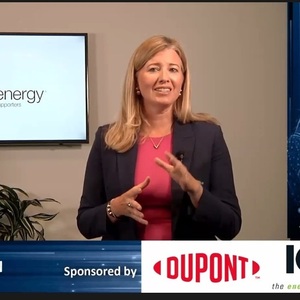Skor focuses on the road ahead in FEW keynote

September 16, 2020
BY Lisa Gibson
“What a year we’ve had,” Emily Skor, CEO of Growth Energy, said in her keynote address at the 2020 International Fuel Ethanol Workshop & Expo. It’s hard to imagine life before COVID-19, she said, adding that the goals she laid out for the industry in February at Growth Energy’s Executive Leadership Conference remain intact. “My vision for this industry hasn’t changed.”
While the ethanol industry has never experienced such an unprecedented fall in demand, there is reason for optimism, Skor said. In managing the crisis, the industry is showing ingenuity. It has faced daunting challenges, but it’s moving faster and more efficiently in surmounting them.
For the first time, FEW is being delivered as a virtual event this year, with speakers dialing in for live Q&As, sending recorded presentations, and featuring a completely virtual trade show. As the industry has been forced to evolve through COVID-19, FEW has, too.
The industry faced large battles even before the pandemic, Skor said. Trade wars, threats to the integrity of the Renewable Fuel Standard and unkept promises, among them.
“Our losses have been huge,” Skor said of the pandemic downturn. “At one point, as much as half the industry was offline.”
Growth Energy worked with plants to secure small business protection, and it’s still working with lawmakers to craft relief packages, Skor said.
But the pandemic also highlighted ethanol’s many contributions to industry in its coproducts. “Keep in mind, we are responsible for over 40 percent of the nation’s industrial carbon dioxide,” Skor said. Ethanol production also provides nearly 40 million metric tons of feed for livestock. “And when there was a shortage of hand sanitizer, the biofuels industry rose to the occasion.
Advertisement
“We showed Washington that ethanol is not only essential, but an unsung hero in the effort to eradicate the virus.
“No other industry is in the same position to revitalize rural America.”
Skor called out President Donald Trump by name, imploring him to stand with U.S. biofuels producers, citing the small refinery exemptions that have dulled demand throughout his presidency. And in June, “Refiners tried to turn their favorite loophole into a time machine,” she said, referring to gap year waivers, which were announced to be denied Sept. 14, two days before Skor’s keynote.
Skor also discussed promising exports and the ongoing work in E15 growth. As the industry and world recovers, she said, Growth Energy is still on task.
Awards
The FEW general session also featured presentation of the Award of Excellence and High Octane Award, historical accolades announced each year at the event. This year’s High-Octane Award winner is Clean Fuels Development Coalition founder and Executive Director Doug Durante. In addition to producing the Ethanol Across America campaign, The Ethanol Fact Book, The Ethanol Minute radio program and more, he has been involved in almost every federal ethanol policy development over the past 40 years, from the trailblazing work of the National Alcohol Fuels Commission in the early 1980s, to the 1990 Clean Air Act and the Renewable Fuel Standard—in both 2005 and 2007.
“The people I’ve met over 40 years, I’ve developed friendships as close as family—people who follow their convictions and their beliefs.”
Durante focused on the benefits of ethanol he has touted for the past 40 years, and the partners he’s worked with.
Advertisement
“I don’t believe there is a single, credible legitimate argument against ethanol. … I’ll debate anyone on that issue.
“I’m honored to have received this award,” he said.
And this year’s Award of Excellence winner is University of Minnesota Department of Bioproducts and Biosystems Engineering research fellow Doug Tiffany. As a research fellow within the University of Minnesota’s Department of Bioproducts and Biosystems Engineering, he has worked on an array of ethanol-related projects ranging from biomass power, cogeneration and coproduct innovation to feedstocks, grain shipping patterns and new products and markets.
Tiffany also touted collaborators and graduate students who helped in his research.
“Thank you for this award,” he said, as he concluded his speech.
Related Stories
The USDA significantly increased its estimate for 2025-’26 soybean oil use in biofuel production in its latest World Agricultural Supply and Demand Estimates report, released July 11. The outlook for soybean production was revised down.
The U.S. Energy Information Administration maintained its forecast for 2025 and 2026 biodiesel, renewable diesel and sustainable aviation fuel (SAF) production in its latest Short-Term Energy Outlook, released July 8.
XCF Global Inc. on July 10 shared its strategic plan to invest close to $1 billion in developing a network of SAF production facilities, expanding its U.S. footprint, and advancing its international growth strategy.
U.S. fuel ethanol capacity fell slightly in April, while biodiesel and renewable diesel capacity held steady, according to data released by the U.S. EIA on June 30. Feedstock consumption was down when compared to the previous month.
XCF Global Inc. on July 8 provided a production update on its flagship New Rise Reno facility, underscoring that the plant has successfully produced SAF, renewable diesel, and renewable naphtha during its initial ramp-up.
Upcoming Events










